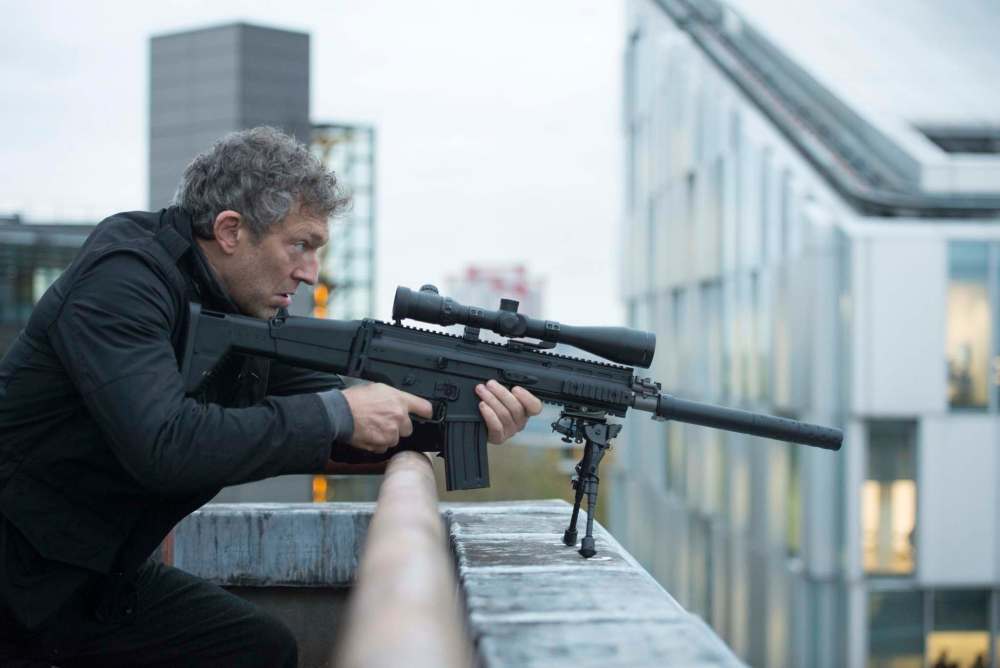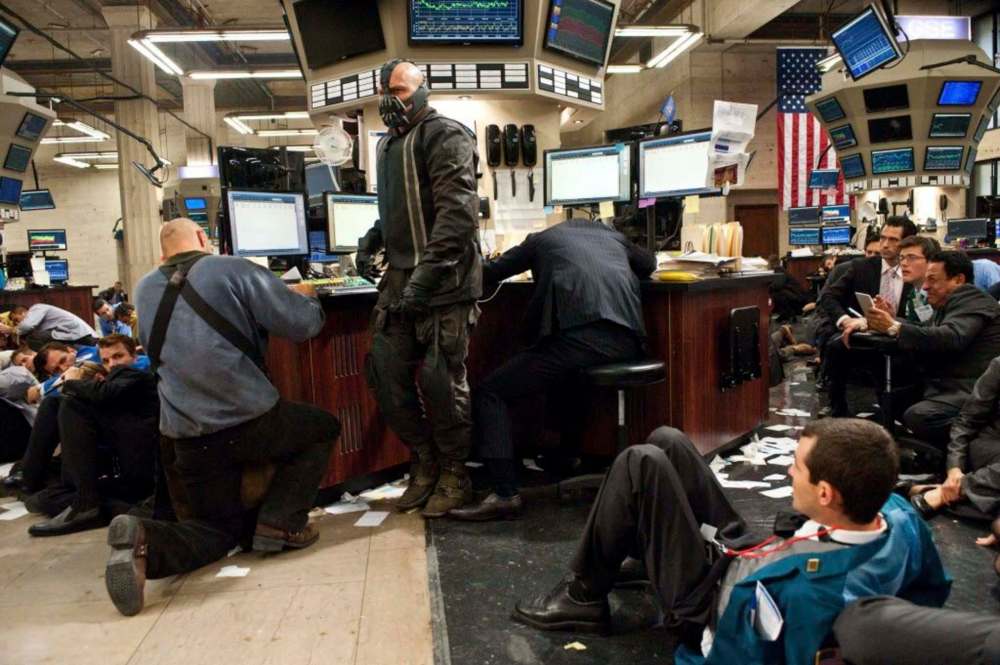Summer blockbusters get dark
Once fun escapist fare, big-budget features increasingly a reflection of reality
Advertisement
Read this article for free:
or
Already have an account? Log in here »
To continue reading, please subscribe:
Monthly Digital Subscription
$0 for the first 4 weeks*
- Enjoy unlimited reading on winnipegfreepress.com
- Read the E-Edition, our digital replica newspaper
- Access News Break, our award-winning app
- Play interactive puzzles
*No charge for 4 weeks then price increases to the regular rate of $19.00 plus GST every four weeks. Offer available to new and qualified returning subscribers only. Cancel any time.
Monthly Digital Subscription
$4.75/week*
- Enjoy unlimited reading on winnipegfreepress.com
- Read the E-Edition, our digital replica newspaper
- Access News Break, our award-winning app
- Play interactive puzzles
*Billed as $19 plus GST every four weeks. Cancel any time.
To continue reading, please subscribe:
Add Free Press access to your Brandon Sun subscription for only an additional
$1 for the first 4 weeks*
*Your next subscription payment will increase by $1.00 and you will be charged $16.99 plus GST for four weeks. After four weeks, your payment will increase to $23.99 plus GST every four weeks.
Read unlimited articles for free today:
or
Already have an account? Log in here »
Hey there, time traveller!
This article was published 10/08/2016 (3370 days ago), so information in it may no longer be current.
If you came of age in the days of Jaws or Top Gun — or even, for that matter, Independence Day or Pirates of the Caribbean — you probably harbour pleasant memories of summer movies.
Part of that fondness stems from the activity itself — cooling down with sugary snacks while epic adventures unfold will cheer up the most dour kid. But what was playing on screen was largely pleasant too.
Sure, a shark may threaten Martin Brody, or Jack Sparrow may get into a sticky duel with Hector Barbossa; heck, it took me a good month after Top Gun to get over Goose’s death after that whole disaster with Maverick, but at heart, the movies were enjoyable, escapist and distracting. You left the theatre alight with a fun experience to bring you into the dreaded school year.

These days, summer movies don’t leave such a soft footprint. Once you headed to the multiplex to get a break from the real world. Now you go there and find CNN.
Jason Bourne showed the U.S. government and a social-media giant spying on ordinary citizens, a shooter terrorizing a public gathering and an armoured vehicle plowing through a crowd of innocents.
Suicide Squad explores a world with a terrorist threat so great the government must turn to maximum-security criminals; police cars are riddled with bullet holes and the U.S. military is overwhelmed by dangers it can neither see nor fully understand.
These events, it should be said, aren’t tragically familiar by accident. They’re meant to be tragically familiar. As Jason Bourne director Paul Greengrass said, “Bourne runs through a contemporary landscape. That’s the trick. It’s not Gotham City. It’s not outer space. It’s a world that feels contemporary.”
Or as Suicide Squad director David Ayer told the Times, “I like the idea of the government running covert ops, using bad guys to do good things against other bad guys. It seemed close to the world we’re in today.”
This idea of a cinematic world that closely parallels the difficulties of our real one has become so de rigueur for summer films that it can seem strange to think of them in any other way, but this is a relatively recent shift, traceable in many ways to the turning over of the Batman franchise to Christopher Nolan a decade ago. (OK, so before him there was Tim Burton. But he’s, you know, Tim Burton.)
Most of the directors who’d previously made summer action films were primarily entertainers — extremely gifted ones, but still entertainers. With Nolan, an auteur who tucked dark questions of self and identity into his early work (Memento, Following) the game changed. He wished to investigate (yes, even in Gotham City) more charged questions — morality, nihilism, post-9/11 ambiguities.
It’s true that the Cold War offered some real-world issues back in the day, but these threats tended to be abstract and bordered on the cartoonish; one would be hard-pressed to compare the thematic seriousness of The Dark Knight with Predator or a Rambo sequel.
With Nolan’s massive summer success, other directors flowed in. Suddenly high-end filmmakers, the type who normally preoccupied themselves with serious subjects, were in charge of action heroes and comic-book villains. The idea of a split between the real-world concerns of Oscar films and the escapism of summer movies — or, more bluntly, between the fall movies that depress us and the summer movies that divert us — began to disappear.
Certainly Ayer and Greengrass come in this Nolan mould. The former is an auteur type who previously had trafficked in urgent social relevancies such as the gritty End of Watch. Greengrass, meanwhile, is a documentary-trained filmmaker behind politically aware films such as Green Zone and Captain Phillips. (He and Nolan began helming major franchises at about the same time, though the latter had a greater influence on Hollywood hiring practices.) Artists like these are, not surprisingly, going to infuse their summer movies with a strong dose of the real.
This also happened with the James Bond series, the franchise moving from froth to, under the recent hand of Sam Mendes, more weighty contemplations of a War on Terror world.
But it would be too simplistic to lay all this on filmmakers. The world in which we see their work has also been growing darker. There’s been a lot of talk about summer — particularly this summer — becoming a time filled with anxiety and fear thanks to events in Dallas, Nice and Orlando, not to mention the political conventions. We occupy a world of more darkness and complexity than we have in a long time.

Maybe more important, social media have become a far more efficient vehicle for delivering that complexity. Stabbings in London, terrorist attacks in France and shootings of unarmed people in the U.S. are the dominant language of these platforms. And it comes at us unremittingly, at least until a new event comes along to replace it.
In a climate where cinema exists not in opposition to social media, but is actively integrated with them, trying to strip films of these associations is impossible. We decide to go to movies because of recommendations on Twitter; we emerge offering our thoughts on Facebook. And when a bombing, mass killing or other horrific event happens, we use these same media, often sandwiching our shock or our horror amid the cultural chatter. Movies remind us of the real world because the tools we use to discuss them remind us of the real world.
I don’t necessarily think this entwining is a bad thing. In fact, you could argue it’s an improvement, that in a culture of distraction leavening our entertainment with substance is a welcome development.
But cinematic parallels are a funny beast. We want our movies to mirror the everyday but, well, not so closely. The Dark Knight Rises, four summers ago, offered this in extremis: Nolan had made a movie about a madman terrorizing groups of innocent people. Yet after the mass shootings at a theatre showing the film in Aurora, Colo., killed 12 people, Bane’s acts felt a little too close to home.
A contemplation of substantive questions is good, but is watching a car plow into a crowd of people a week after Nice welcome? Is watching a character named Deadshot — for all his brio and his movie’s gleeful spirit — get into shootouts with law-enforcement a release?
None of these questions will end this weekend. Ben-Hur, which opens in theatres later this month, taps into global conflict in its own way. The film’s message of forgiveness is encouraging, but its undercurrent of religious violence may also be uncomfortable. Further out, how much will we continue wanting this from our summer movies? If the world stays on its current dark path, will we wish for a doubling down on seriousness?
Or will we hope to go the other way, yearning for the insulated days of Val Kilmer’s shirtless Iceman and beach volleyball?
There is no simple answer, and each filmmaker and filmgoer will answer the question for themselves, but a few things are becoming clear. Exploring serious issues may be an outgrowth of our world. It may even be a necessary part of world, but it’s changed the entertainment experience into something more fraught and less enjoyable. Summer doesn’t mean what it once did. And neither does its cinema.
— Los Angeles Times

